

FARMERS, THE ORIGINAL PIVOTERS





















How smart technology and innovation are improving yields and promoting more sustainable practices






















With an extensive product lineup, ISUZU remains a trusted partner to the farming community, supporting the backbone of our economy – agriculture
As we observe Food Security Month this October, we’re reminded of agriculture’s vital role in sustaining South Africa’s food supply. With population growth and climate challenges, our farming sector’s resilience is key.
For decades, ISUZU has been a leader in automotive reliability, especially in the commercial vehicle sector. The ISUZU heritage is deeply intertwined with the agricultural industry, providing tough, reliable and durable vehicles that meet the demanding conditions of farming life. ISUZU’s extensive product range makes it a trusted partner to the farming community and the agricultural sector.
Agriculture is the backbone of rural communities countrywide and for those working the land and raising livestock, dependability is key to maintaining food production. Whether transporting feed, moving animals or navigating tough terrain to oversee crops, these daily tasks are essential in keeping farms productive and ensuring the nation’s food security.
That’s why vehicles such as the ISUZU D-MAX Single Cab bakkie are trusted companions for farmers. ISUZU has built a reputation on power and reliability, offering models that can handle the demanding conditions of agricultural life without faltering. When the welfare of livestock and the success of crops are at stake, the durability of a dependable vehicle becomes invaluable.
The D-MAX Single Cab bakkie has consistently proven its value in the agricultural sector. Farmers rely on it for its perfect balance of power, versatility and ef ciency. Whether hauling livestock, transporting feed or navigating rugged farm terrain, it stands out as the ideal workhorse. A well-engineered single cab can be the difference between a productive day and one marred by breakdowns and delays.

THE D-MAX SINGLE CAB BAKKIE HAS CONSISTENTLY PROVEN ITS VALUE IN THE AGRICULTURAL SECTOR. FARMERS RELY ON IT FOR ITS PERFECT BALANCE OF POWER, VERSATILITY AND EFFICIENCY.
Here’s what the ISUZU D-MAX Single Cab offers – the vehicle that drives South Africa’s farming community and strengthens the country’s food security.
• Durability and reliability. In agriculture, equipment and vehicles are subjected to harsh working conditions – uneven terrain, muddy elds, dusty roads and frequent heavy use. The ISUZU D-MAX Single Cab bakkie is designed with these challenges in mind. With its rugged construction, reinforced chassis and high ground clearance, it is built to navigate dif cult farm roads and rough terrain where regular vehicles may struggle. This vehicle is engineered for longevity, ensuring minimal downtime and maximum productivity.
• Payload capacity. Agricultural work often involves transporting heavy loads – moving livestock, carrying crops and hauling equipment. The ISUZU D-MAX Single Cab bakkie offers impressive payload capacity, ensuring farmers can transport large quantities in a single trip.
• Fuel efficiency. Fuel costs are a major consideration for farmers who frequently cover long distances or spend extended periods running their vehicles. The ISUZU D-MAX Single Cab’s engine is designed for high fuel ef ciency, ensuring minimal fuel consumption without sacri cing performance.
• Low maintenance costs. Given the signi cant wear and tear farm vehicles endure, frequent servicing can drain time and nances. However, ISUZU vehicles are built with durability in mind, ensuring long service




intervals and affordable replacement parts. The extensive network of ISUZU service centres across South Africa further reduces downtime by ensuring that parts and repairs are easily accessible.
• Comfort and safety. While dependability is a priority, ISUZU doesn’t compromise comfort and safety. The ISUZU D-MAX Single Cab features a spacious interior with adjustable seating and modern systems to ensure comfort during long hours on the road or in the eld. In terms of safety, features, such as airbags, transponder immobiliser systems and anti-lock braking systems, help protect drivers and passengers, even in the most challenging driving conditions.
In an era where food security is critical, the agricultural sector is the foundation on which our nation’s sustenance relies. Vehicles like the ISUZU D-MAX Single Cab bakkie are reliable partners that help farmers keep their operations running smoothly, ensuring South Africa’s food supply remains strong.











This edition of Agriculture takes a deep dive into the evolving landscape of South African farming. Agriculture has always been the backbone of our economy, feeding millions and supporting rural livelihoods. But today, more than ever, it stands at the intersection of innovation, nance and technology – key pillars that will de ne its future.
In this issue, we explore how the nancial services sector is stepping up to ensure the sustainability of our farms. As food security becomes an ever-growing priority, nancial institutions are creating innovative solutions to support farmers in their pursuit of a stable and prosperous future. In our nance section, we delve into how these partnerships are shaping the resilience of agriculture and empowering farmers to weather economic challenges.
Innovation has always been a cornerstone of farming, and today’s farmers are at the forefront of change. In our innovation feature, we look at how South African farmers are balancing tradition with technology, ensuring they remain competitive while safeguarding their businesses. From precision
farming to soil health management, the ingenuity of our farmers continues to inspire.
And speaking of technology, the future is already here. In our technology report, we explore the rise of smart farming tools – advanced sensors, drones and data analytics – that are transforming the way we understand and cultivate our crops. These innovations not only improve yields, but also promote more sustainable and ef cient practices. This edition is a tribute to the resilience and adaptability of our farmers, who continue to feed our nation while navigating complex challenges. We hope the stories and insights shared here inspire and inform you as we continue to cultivate a thriving, innovative and sustainable agricultural sector.
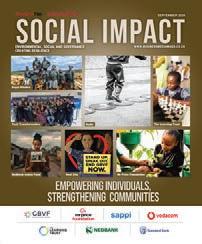




PUBLISHED BY
Picasso Headline, A proud division of Arena Holdings (Pty) Ltd, Hill on Empire, 16 Empire Road (cnr Hillside Road), Parktown, Johannesburg, 2193 PO Box 12500, Mill Street, Cape Town, 8010 www.businessmediamags.co.za
EDITORIAL
Content Manager: Raina Julies, rainaj@picasso.co.za
Editor: Lindi Botha
Contributors: Liza Bohlmann, Paul Makube, Busisiwe Mboyisa
Copy Editor: Brenda Bryden
Content Co-ordinator: Natasha Maneveldt
Online Editor: Stacey Visser vissers@businessmediamags.co.za
Head of Design: Jayne Macé-Ferguson
Senior Designer: Mfundo Archie Ndzo
Cover Image: istock.com/Kinwun
SALES
Project Manager: Jacqueline Bezuidenhout +27 78 172 7776, 021 469 2478 jacquelineb@picasso.co.za
Sales: Robert Skeen

5 FINANCE
The nancial services sector is stepping up to support agriculture and help ensure food security.
6 INNOVATION
Farmers, the original pivoters: balancing the need to adopt new technologies and methods with the caution required to ensure their farms stay in business.
12 TECHNOLOGY
Future farming, today: smart technology is helping farmers understand their crops better, making for more effective interventions.

PRODUCTION
Production Editor: Shamiela Brenner
Advertising Co-ordinator: Johan Labuschagne
Subscriptions and Distribution: Fatima Dramat fatimad@picasso.co.za
Printer: CTP Printers, Cape Town
MANAGEMENT
Management Accountant: Deidre Musha
Business Manager: Lodewyk van der Walt
General Manager, Magazines: Jocelyne Bayer









COPYRIGHT: Picasso Headline. No portion of this magazine may be reproduced in any form without written consent of the publisher. The publisher is not responsible for unsolicited material. AGRICULTURE is published by Picasso Headline. The opinions expressed are not necessarily those of Picasso Headline. All advertisements/ advertorials have been paid for and therefore do not carry any endorsement by the publisher.


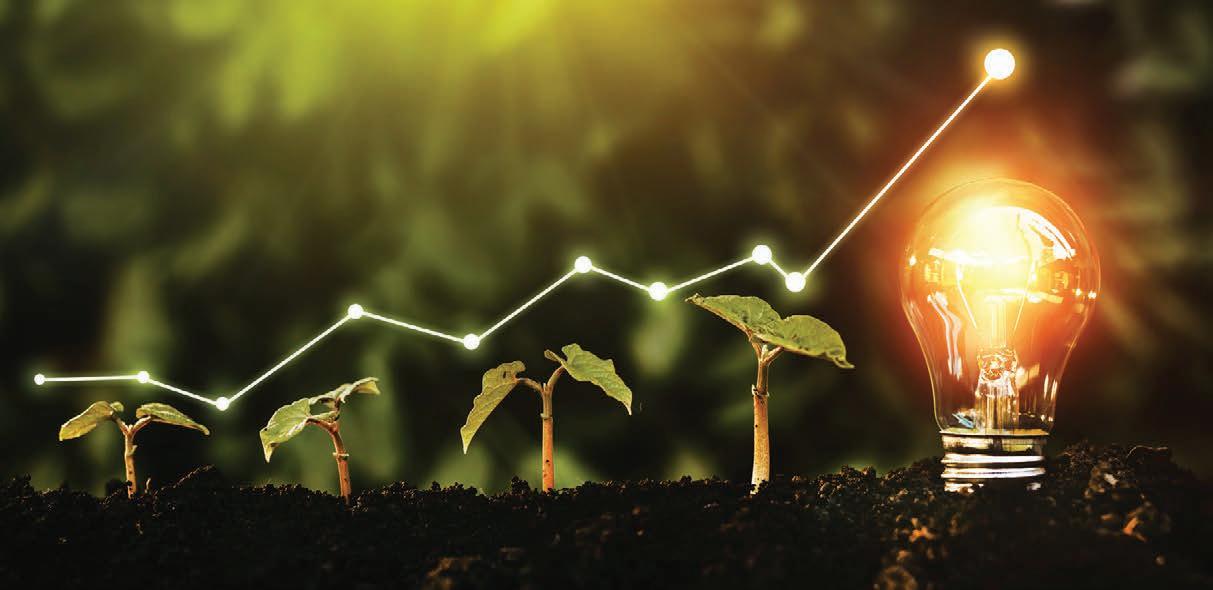
The financial services sector is stepping up to support agriculture and help ensure food security. By PAUL MAKUBE , senior agricultural economist at FNB Commercial
Extremes in global weather patterns continue to disrupt economic activity across all the continents. These extremes include increased variability in rainfall patterns, such as oods that rip out infrastructure and decimate crops, rising temperatures and subsequently, droughts that cause famine and unrest.

The situation became so urgent that countries around the world realised the phenomenon of climate change was real and that necessary actions were required to turn the tide and preserve the world for future generations. A weighty decision was made to undertake investment in efforts to move the world to a low-carbon economy through adaptation and the reduction of greenhouse gas (GHG) emissions. Thus, stakeholders in the global economy, such as governments, investors, businesses and private individuals, have incorporated environmental, social and governance factors into their operations to drive this change and bring long-term value to society.
While there has been considerable progress on this matter, the recent energy crisis in South Africa has been a catalyst to move even faster in adapting and adopting green energy technologies to help businesses eventually achieve a level of energy independence. As it
Paul Makube
became increasingly clear that Eskom’s supply of electricity would become unreliable and expensive, given the multiyear increases in tariffs, players in the agriculture value chain embarked on various solutions to reduce this dependency and ensure the sustainability of production.
These investments have come at a huge cost, and the obvious question has always been around the accessibility of nancing mechanisms.
The answer is that green nancing is reasonably available throughout the nancial services sector, with banks providing loans for speci c green activities, such as nancing solar installations, biogas plants and water-saving irrigation systems. The good thing is that efforts to reduce GHGs will now be rewarded through gaining credits and compliance with regulations in various importing regions that have adopted strict policies on accounting for carbon emissions, such as the European Union.
The impact of this will grow tremendously over the next few years as banks get better at collecting and disclosing data. There is suf cient interest from the agriculture sector, especially if there are incentives linked to nance, such as lower interest rates. Various banks have adopted guidelines for green loan qualifying criteria. FNB’s focus is on supporting the main principles of sustainable agriculture,
The recent energy crisis in South Africa has been a catalyst to move even faster in adapting and adopting green energy technologies to help businesses eventually achieve a level of energy independence.
which include resource ef ciency, regenerative agriculture and a circular economy, with the primary objective of maintaining food security. This will entail the formulation of nancial solutions to support, among others, the following practices:
• Energy management through tracking consumption, ef ciencies and renewable energy options.
• Carbon management: measurement of carbon emissions and emissions-reduction plans.
• Ef cient water use backed by improved irrigation technologies such as drip irrigation, night-time irrigation, application of mulch and liners to retain soil moisture.
• Adoption of drought-resilient and pest-resistant cultivars.
• Reduction of industrial chemicals in pest management and fertiliser applications, implementation of shade and pest netting, and use of organic pesticides and fertiliser.
• Biodiversity management, invasive species clearing, endangered species protection and re management.
• Farm and agri-industrial waste management.
• Improved livestock herd management and nutrition, appropriate stocking and management of herd ratios and breeding, vaccination programmes and improved pest control practices.
Overall, green nancing is still in its infancy and will develop over time. So, there are still challenges. The rst is enticing producers to go on this journey. Not all farmers can do so or have the nancial muscle to do it, and others may simply ignore or not believe in climate risk.
The second is quantifying what has already been achieved and understanding the journey some producers have already undertaken; and data on this aspect is relatively thin.
Nonetheless, there are endless opportunities in green nancing as it will unlock new funding streams for banks, stimulate innovation, improve ef ciencies and reduce costs for farmers. It will all be for the greater good of the industry for generations to come.

Farmers must balance the need to adopt new technologies and methods with the caution required to ensure their farms stay in business, writes
LIZA BOHLMANN, former chairperson of Agricultural Writers SA
South African farmers returning from study tours abroad tend to step off the plane with a con dent spring in their step, knowing they can compete with the best of the best globally. This is not overreaching. I have seen my fair share of farms across the globe and it’s true: South African farmers embrace technology, push the envelope on ef ciency and farm with the future in mind. They really can be proud of what they are achieving.
Farming has become an immensely challenging profession as farmers face obstacles from every direction. Climate change, crime, rising input costs and access to markets are just some challenges that require new solutions. As innovation in all spheres of society speeds up, farmers are often rapped over the knuckles for being too slow to adapt.
Considering that farming timelines are usually measured in seasons or, in the case of fruit and nut trees, years, farmers adapting to consumer preferences are actually moving quite fast. It is important to understand that farmers are in it for the long haul. For the vast majority, their career in agriculture is a lifelong commitment. A farmer is responsible for every living thing and asset on the farm. The responsibility and pressure they face are unrelenting and decisions are therefore made very carefully.
As a generational profession, farmers are, for the most part, focused on honouring the legacy of their hardworking parents or grandparents. They are also acutely aware of the need to stay in business to ensure the next generation has a
farm to call home. One wrong decision to adapt to a new trend and a year’s income could be lost. To succeed, they must farm with the future in mind and be sure that today’s decisions will bene t their heirs.
Predictability makes farming easier, while constant change makes nding the right recipe for success more dif cult. Farmers are keen to adopt new technology – if there is certainty about the bene ts. The greatest uptake is in technologies that help farmers make better decisions about key moments in the crop cycle: GPS technology and self-driving hardware in their tractors and normalised difference vegetation index mapping of crops to manage the use of machinery and inputs. Applying water to the precise millimetre per day and the correctly balanced fertiliser mix or crop protection products per tree is no longer a

FARMERS ARE KEEN TO ADOPT NEW TECHNOLOGY – IF THERE IS CERTAINTY ABOUT THE BENEFITS.
futuristic dream, but part of a normal day for some farmers.
Climate change has thrown much predictability of the weather out of the window yet farmers have found ways to adapt. The advent of regenerative farming practices has brought an interesting dynamic to modern farming. While initially, it might look like farming has gone back a few generations to when elds weren’t ploughed and minimal fertilisers were used, a closer look reveals a partnership of the old and the new. No-till planters, tractor software that allows for variable rate input applications and in- eld phone apps that measure the microbial content of the soil have all been quickly adapted to make farming amid climate change possible.
Unsurprisingly, the younger generation of farmers is focused on farming more scienti cally and more precisely and is in uencing some older generations to adopt a different way forward. They are keen to show how aspects, such as targeted pest control, biotechnology, precision breeding and soil health, can bene t planet, people and pro t. Deciding to invest thousands or millions of rand to change a production system is not a small or cheap decision. However, once achieved, these changes for the better are glorious and inspiring. These waves of change already exist in South Africa and, with every innovation, we are seeing greater acceptance of technology. But make no mistake: farmers are not fools and technology will need to prove its worth for the farm and future generations before it will be adopted.


Cape Karoo Culling’s COR JANSEN VAN VUUREN writes that the company is committed to maintaining a delicate balance between wildlife conservation and sustainable land management
The culling industry plays a crucial role in ensuring the health and longevity of South Africa’s diverse wildlife. Culling is a regulated practice that helps control animal populations, preventing overgrazing, habitat destruction and resource depletion. Without careful population management, ecosystems can become overburdened, leading to the degradation of natural habitats and the eventual decline of species.
Cape Karoo Culling works alongside environmental agencies to ensure that wildlife numbers remain in harmony with the environment, protecting biodiversity for future generations. Additionally, the culling industry has signi cant socioeconomic bene ts. By responsibly managing wildlife populations, Cape Karoo Culling helps sustain local communities through job creation, ethical meat production and the utilisation of byproducts, such as leather and bone, reducing waste while promoting sustainable living. These resources contribute to food security and provide materials for local crafts and industries.
CAPE KAROO CULLING WORKS ALONGSIDE ENVIRONMENTAL AGENCIES TO ENSURE THAT WILDLIFE NUMBERS REMAIN IN HARMONY WITH THE ENVIRONMENT, PROTECTING BIODIVERSITY FOR FUTURE GENERATIONS.
Importantly, Cape Karoo Culling adheres to stringent ethical standards, ensuring that all practices are humane and conducted under the guidance of wildlife specialists. This ensures minimal stress to the animals and preserves the natural balance of our ecosystems.
At its core, responsible culling is about sustainability. Through scienti cally backed wildlife management, Cape Karoo Culling is helping preserve South Africa’s rich biodiversity while supporting conservation efforts that bene t both nature and people. Together, we can ensure a future where wildlife and humans coexist in balance.

For more information: 076 248 0275
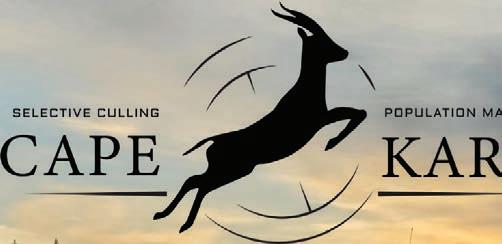


Cape Karoo Culling is a professional culling team that operates across South Africa.


We cull all game species, from warthog to buffalo. Depending on the cull, we offer daytime, night-time and helicopter culling. Contact us at 076 248 0275

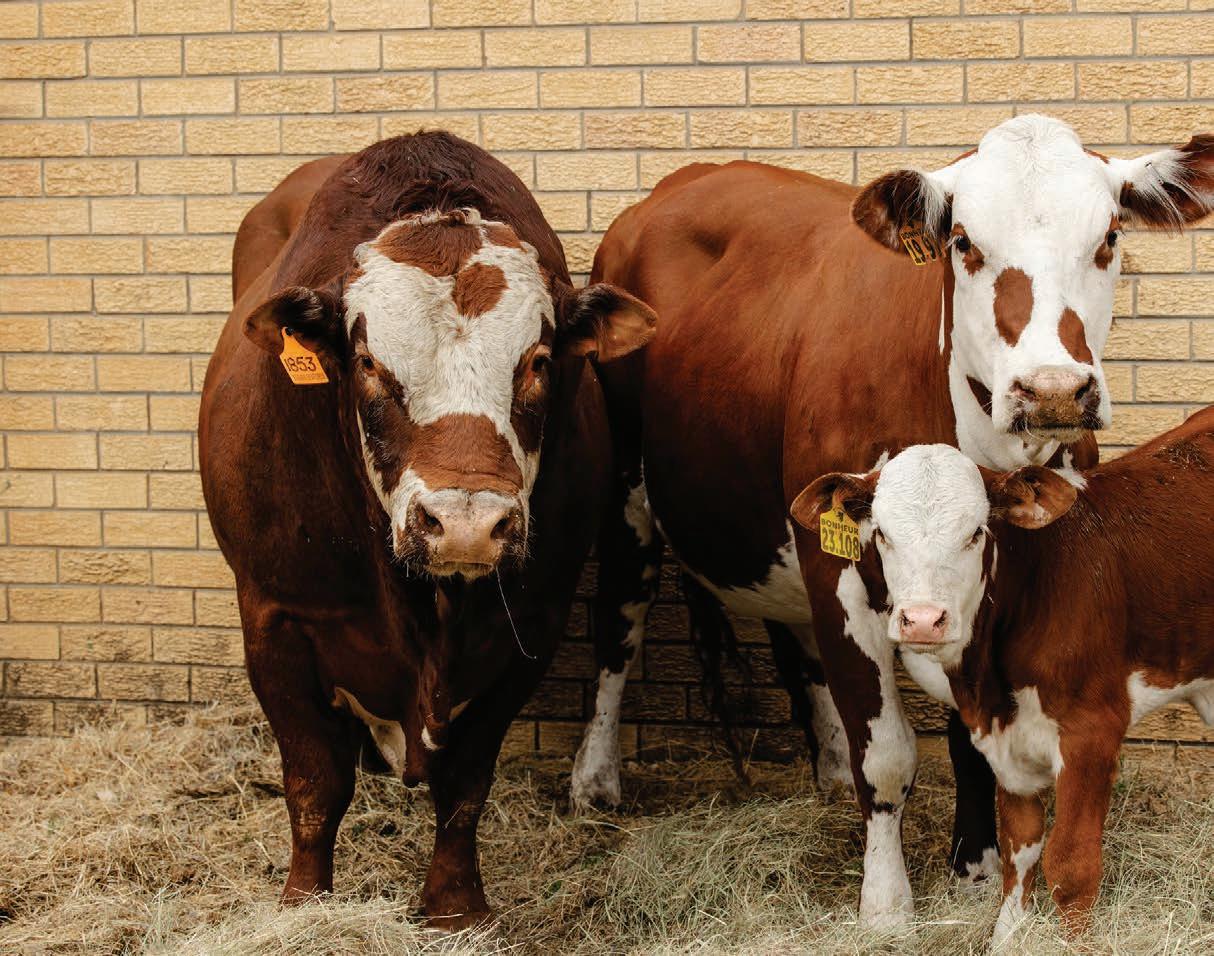
NAMPO ALFA 2024 BRINGS TOGETHER KEY PLAYERS FROM THE LIVESTOCK, HUNTING AND OUTDOOR SECTORS, PROVIDING A UNIQUE PLATFORM FOR NETWORKING, EDUCATION AND EXCHANGING INNOVATIVE IDEAS.
• Lucerne Expo: a rst for NAMPO ALFA, this expo will focus on the critical role of lucerne in economic livestock production.
• Livestock Production Academy: in partnership with SA Studbook, Landbouweekblad will host this academy to support pro table livestock farming.


GRAIN SA shares that the NAMPO ALFA expo, taking place from 17–19 October 2024 at NAMPO Park, Bothaville, is set to be a landmark event, expanding horizons for the livestock, hunting and outdoor industries
Building on the overwhelming success of NAMPO ALFA 2023, which saw a record-breaking number of tickets scanned at the gates and a 50 per cent growth in exhibitors, the 2024 event promises to be even bigger and better. This unique event brings together farmers, wildlife enthusiasts, hunters and outdoor fanatics to celebrate their shared passion for nature and all that comes with it.
NAMPO ALFA 2024 brings together key players from the livestock, hunting and outdoor sectors, providing a unique platform for networking, education and exchanging innovative ideas. The expo has become essential for enthusiasts and professionals, fostering a strong sense of community and collaboration across these interconnected industries on a single platform. The blend of champion livestock, innovative vehicles, outdoor gear and rearms at last year’s NAMPO ALFA expo drew record crowds to NAMPO Park, highlighting the growing appeal of this dynamic event.
This year, attendees can look forward to several exciting expansions and new opportunities that re ect the dynamic nature of these industries:
• RPO National Congress: the RPO will host its national congress during NAMPO ALFA 2024, a seamless t with the event’s focus on livestock.
• Small-scale Beef Cattle Producers Conference: this conference and workshop, featuring RMIS, NLFA, RPO and Sernick, will provide small farmers with the chance to compete in a carcass competition and learn how to produce beef cattle that can thrive in South Africa’s commercial market.
• International focus: the Waymakers International lounge will cater to the growing number of international visitors, particularly from Africa.
• Mechanisation pavilion: presented by Nexus and Agri Voice, this pavilion will spotlight mechanisation in the livestock industry, featuring equipment such as feed mixers, hammer mills, balers and livestock transport solutions.
• Reproduction technology pavilion: this new addition will introduce the latest advancements in reproduction technology for the livestock industry.
The hunting and outdoor programme is packed with activities, including:
• A treasure hunt exploring the realm of participating exhibitors.
• The hinterland shooting range for practical shooting experiences and captivating demos.
• 4x4 demonstrations and exhilarating ride and drive sessions.
• Motorbike skills demonstrations, witness daring motorbike performances and partake in practical riding courses.
• Fishing activities – participate in a daily shing tug-of-war competition;
• Helicopter rides for the more adventurous at heart.
• Drone demonstrations like you’ve never seen before.
• Adam Tas and Joki share hunting stories during a brandy tasting for guests.
• Shooting training with the Fortis Group.
NAMPO ALFA 2024 will also feature an expanded social programme, providing industry-speci c networking opportunities. The popular “People’s Choice” competition for beef, venison biltong, cheese and pork will also return, adding an element of friendly competition and celebration of quality products.
The inclusion of activities and programmes for all ages highlights NAMPO ALFA’s evolution into a family-friendly event. This focus ensures the preservation of cultural and
historical traditions associated with livestock farming, hunting and outdoor living, while also introducing younger generations to these vital industries. The NAMPO ALFA expo presents a range of exciting opportunities, showcasing hands-on demonstrations with 4x4 vehicles, off-road caravans, camping gear and the latest hunting equipment. Additionally, a dedicated shooting range invites attendees to personally test weapons of different calibres at various distances up to 400m, following strict safety protocols.
The expo remains committed to promoting sustainable practices within the livestock, hunting and outdoor sectors. By offering educational workshops, performance championships and the Money Maker quali ers, NAMPO ALFA ensures participants are equipped with the knowledge and tools to manage their operations ef ciently and responsibly.
“At NAMPO ALFA 2024, we’re bringing together the best of livestock, hunting and outdoor industries for a truly immersive experience. It’s not just about seeing the latest gear or watching demonstrations; it’s about getting hands-on, talking directly
“WHETHER YOU’RE HERE TO EXPLORE, LEARN OR CONNECT, NAMPO ALFA 2024 IS WHERE OPPORTUNITIES AND INDUSTRY LEADERS COME TOGETHER TO SHAPE THE FUTURE.” – DIRK STRYDOM

Whether you’re here to explore, learn or connect, NAMPO ALFA 2024 is where opportunities and industry leaders come together to shape the future,” says Dirk Strydom, NAMPO’s managing director. OFM, the Sound of Your Life, is excited to be the proud broadcast partner of the annual NAMPO ALFA expo, once again. This
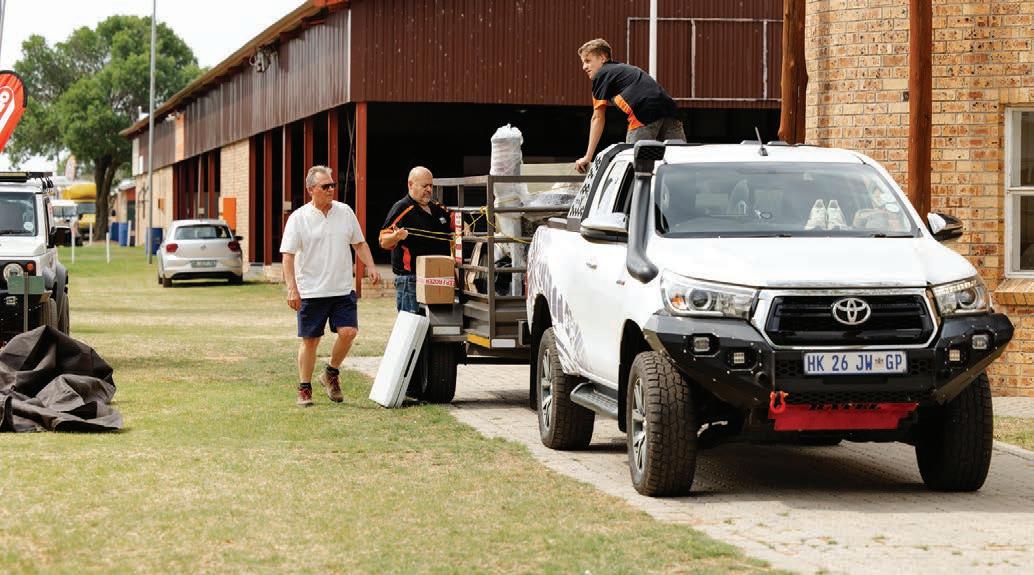
THE INCLUSION OF ACTIVITIES AND PROGRAMMES FOR ALL AGES HIGHLIGHTS NAMPO
EVOLUTION INTO A FAMILY-FRIENDLY EVENT. THIS FOCUS ENSURES THE PRESERVATION OF CULTURAL AND HISTORICAL TRADITIONS ASSOCIATED WITH LIVESTOCK FARMING, HUNTING AND OUTDOOR LIVING.

premier event is a stellar showcase of the top breeding stock available in South Africa and the latest innovations in hunting gear and outdoor equipment.
With gates opening daily at 8am and closing at 5pm, visitors can explore the expo and immerse themselves in a range of exciting activities. The entrance fee is R70 per person and there is no charge for preschoolers. Tickets are available at the gate and online through TicketPro. Parking will also be available free of charge.
The NAMPO ALFA expo builds on the success of its predecessors, combining the best elements of the ALFA livestock expo, which has grown to be the largest in the country, with a thrilling hunting and outdoor section. The venue, NAMPO Park, is perfectly equipped to host such a multifaceted event.

CROPLIFE SA is training farmers and farm workers in the responsible use of crop protection solutions
Crop protection is a vital pillar in the continuous pursuit of our farmers to provide enough food for the growing population, but it should not pose a risk to human health or the environment, which is why it is so important that everyone who works with these products is properly trained in the responsible use thereof.
This kind of education cannot be treated as a “nice-to-have” and it is our collective duty to make the necessary information available to those who need it. However, it is also everyone’s responsibility to follow the instructions and precautions communicated to them, just like any health remedy prescription or
OVER THE PAST YEAR, CROPLIFE SA AND ITS CERTIFIED TRAINERS OFFERED RESPONSIBLE USE TRAINING TO NEARLY 6 000 FARMERS AND FARM WORKERS.
user instruction manual. Thankfully, with the dawn of the digital era, we have the necessary tools to reach as many people as possible to promote responsible use of crop protection solutions.
CropLife SA has embarked on an initiative to train as many people as possible in the responsible use of crop protection solutions. The ultimate goal of these sessions was to equip those in the industry who regularly interact with farmers and farm workers, or who may offer other services to them, to be in a position to transfer the knowledge obtained in the module to those who need it most. In addition, many sessions were conducted directly on-farm to agricultural workers.
UNDERSTANDING AND COMPLYING WITH LEGISLATION
The training consists of numerous aspects pertaining to responsible use, such as wearing the correct personal protective clothing, the safe mixing, application, storage and transport
of crop protection products, what to do in an emergency and what should be on the label. The Globally Harmonized System of Classi cation and Labelling of Chemicals (GHS) became a legal requirement from September 2022 and is stipulated in the Regulations for Hazardous Chemical Agents No. R280 of 29 March 2021.
It requires that labels and safety data sheets of crop protection products follow a standardised approach in communicating the hazards of the chemicals – it is critical that farmers and farm workers note this. The hazards associated with a particular chemical, their nature and severity, are communicated through several elements, such as hazards statements, hazard pictograms and signal words on both the label and the safety data sheet of the product. In addition, the regulations pertaining to agricultural remedies published in August 2023 also stipulate requirements that must appear on the main and secondary panels of the label, such as emergency numbers, registration number and shelf-life or expiry date, to name a few.
So why is the label so important? According to Regulation No. R1716 of 26 July 1991, the use of an agricultural remedy for any other purpose or in any other manner than what is instructed by its label is illegal, so people working with these products must know how to interpret the label and where to nd critical information. The new GHS layout will also signal certain actions that need to be taken by the farmer or farm worker.
Other topics covered in the training include compliance with the Occupational Health and Safety Act, 1993 (Act No. 85 of 1993), which compels farm workers and farmers who mix and apply agricultural remedies, to wear the appropriate personal protective clothing, and the extended producer responsibility regulations of the National Environment Management: Waste Act, 2008 (Act No. 58 of 2008) which requires that all empty agricultural remedy containers be triple rinsed and recycled.
Over the past year, CropLife SA and its certi ed trainers offered responsible use training to nearly 6 000 farmers and farm workers. This is only the start because as more people are trained, the stewardship snowball gets bigger. Together we can ensure that each person who is busy protecting our food crops, also knows how to protect themselves, their loved ones and the environment.









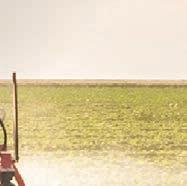

Publication date: MAY 2025

The Agriculture publication, inserted into the Sunday Times, covers a wide range of topics including sustainability, innovations, technical advice, animal husbandry, crop production as well as key developments and core concerns relating to the agriculture and farming industries.


ADVERTISING CONTACT
Jackie Bezuidenhout
Project Manager
Tel: 072 430 9392
Cell: 078 172 7776
Email: JacquelineB@picasso.co.za
PICASSO HEADLINE, a proud division of ARENA HOLDINGS (Pty) Ltd Hill on Empire 16 Empire Road (cnr Hillside Road), Parktown, Johannesburg




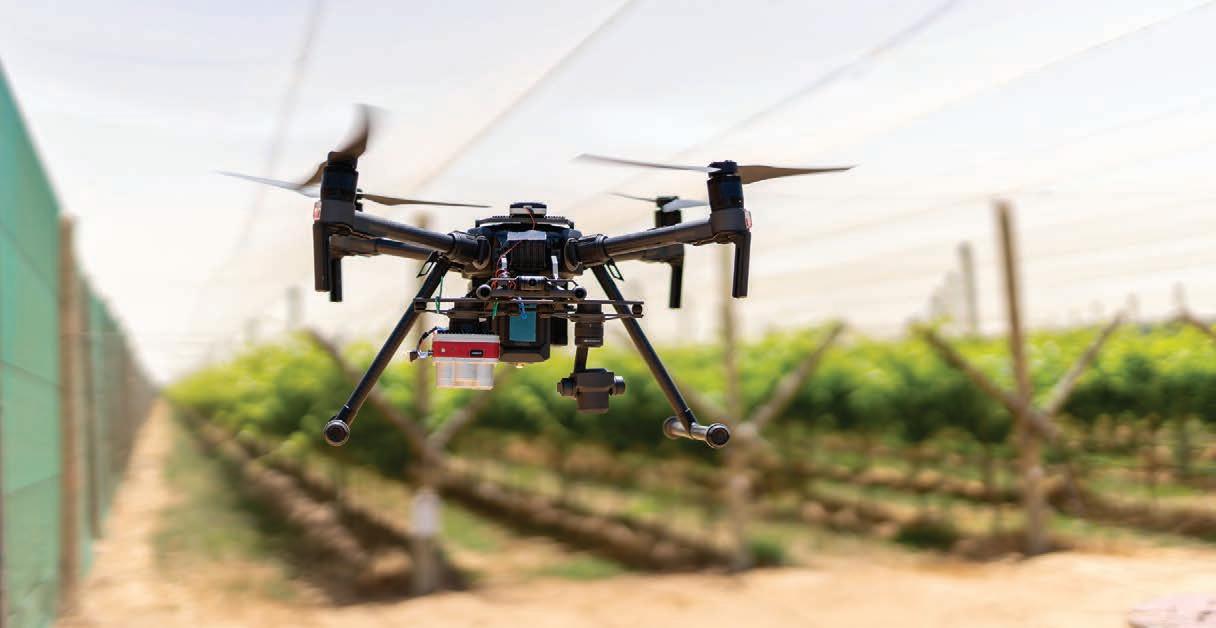
Smart technology is helping farmers understand their crops better, making for more effective interventions, writes BUSISIWE MBOYISA
Farming today is different to the dusty, dirty enterprise it used to be. Cutting-edge technology employed across numerous practices has placed many farmers in front of screens, analysing data and making decisions without needing to get their shoes dirty.
The application of advanced technologies, such as satellites, drones, robotics, smart irrigation systems and sensors, has catapulted how farmers interact with agricultural environments into the future. Decision-making has become easier and greater insights have led to cost savings as processes become more ef cient.
“The bene ts extend across the whole system,” says Ken Trealor, general manager of aerial analytics company Aerobotics. “It’s not just farmers getting production gains, the planet and its people also bene t from lighter carbon footprints, less waste of natural resources and economic stability as food production is enhanced.”
Aerobotics has grown into a big player on the agricultural technology front over the last few years. When drones became more easily accessible to consumers some 10 years ago, the hype led many farmers to explore their farms from above. The missing link, however, was data interpretation, a eld that has grown in leaps and bounds since.
This is where Aerobotics stepped in, providing specialist drones to collect
information on farms and software to process the information. “We realised quickly that arti cial intelligence could be used to process this aerial imagery, identifying problems far earlier by analysing characteristics of trees and vines previously invisible to farmers,” says Trealor.
As such data collectors grow, the value of the information they gather is compounded and farmers can expect far greater insights in future as this intelligence is leveraged. Trealor explains that the more data the company collects, the easier it becomes to spot patterns and predict outcomes. “This means farmers will be noti ed earlier when there are pest are-ups that need controlling, or when fruit has reached its optimal size and ripeness and must be harvested to prevent quality loss.”
While drones are advancing to enable more precise crop spraying, seed sowing is now also being explored to save fuel costs and minimise soil-compacting traf c in the elds. Trealor highlights time savings in this regard, since drones can sow seeds across elds far quicker than tractors.
Ever-tightening margins mean farmers are looking for ways to maximise production while minimising costs. South Africa’s limited water resources make this an added focus area for technological solutions.
A relatively new player in the market is SupPlant, which is taking farmers one step closer towards self-run systems. SupPlant
“THROUGH SOIL MOISTURE SENSORS, WEATHER PREDICTIONS AND PLANT AND FRUIT GROWTH SENSORS, WE CAN ‘LISTEN’ TO THE PLANTS AND MEET THEIR PRECISE IRRIGATION NEEDS.” – JAN VAN DER MERWE
monitors individual trees in an orchard, collecting data on water and nutrient uptake. This information is used in conjunction with climatic conditions to establish plant behaviour patterns and the ideal times to apply water. The result is a reduction in irrigation costs and water since the trees are only ever given exactly what they need, when needed.
Jan van der Merwe, country manager for SupPlant, explains that data collection has been taken to a new level with this technology. “Through soil moisture sensors, weather predictions and plant and fruit growth sensors, we can ‘listen’ to the plants and meet their precise irrigation needs. This allows for timely intervention and the ef cient use of resources, translating to savings in time, money and water.”
The heartbeat of the SupPlant system is its algorithm, which translates the data into actions that are taken without requiring a farmer’s attention. Once the system has established the plant’s needs, it automatically switches the irrigation system on or off. Since data is collected every 10 minutes, there is no lag in supply and demand.
The technology is already proving its worth beyond water savings as quality and yield are improved. Van der Merwe refers to a fruit farm in the water-strapped Western Cape where water savings amounted to 39 per cent. On a nearby citrus farm, yields increased by 69 per cent in the second year of using the technology, while a macadamia farm in Mpumalanga showed a 21 per cent increase.
With the host of data-collection applications available on the market, farmers are cautioned to choose wisely. Trealor says they must take care to understand technology fully before buying into it. “Know exactly what you want to achieve when selecting applications and only choose those that will give you real results.”
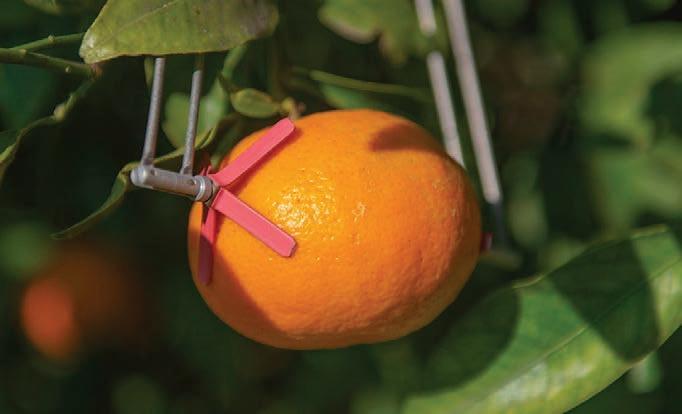
on fruit help to “read” the tree’s


